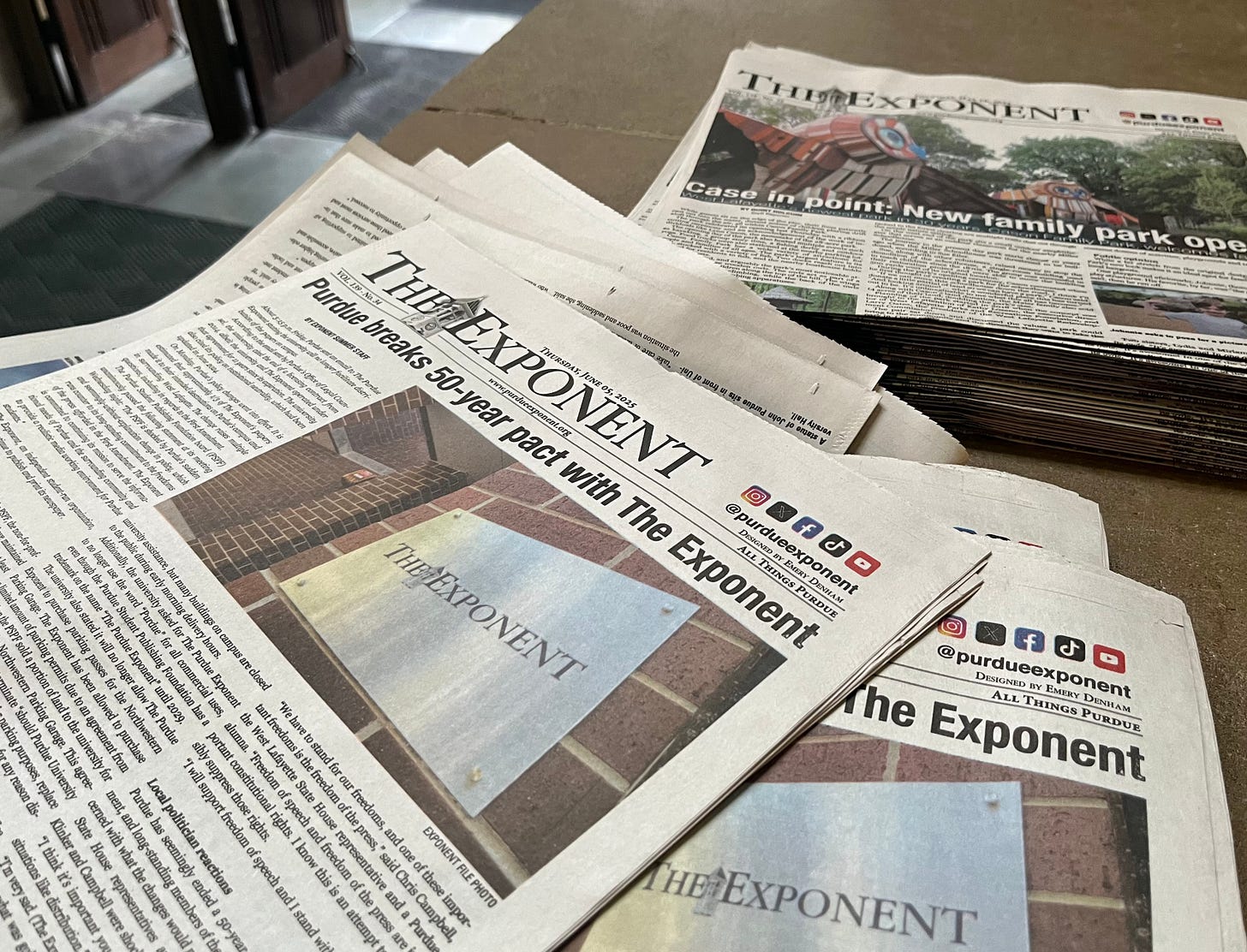Purdue quiet on reasons for distancing itself from The Exponent
University asks independent, student-run newspaper to drop ‘Purdue’ from its name, while telling Exponent it will no longer help with distribution. Plus, a new 50-year plan for Purdue’s Indy campus
Support for Based in Lafayette comes from Purdue Convocations. Just Announced: Purdue Convocations' blockbuster 2025–26 season is here! From Lauren Daigle to Tom Segura, Beetlejuice, The Book of Mormon, Jim Brickman, Wynton Marsalis and so much more—this lineup brings Grammy winners, Broadway hits, jazz legends and unforgettable live shows to West Lafayette. Visit convocations.org/events for complete show details! Tickets go on sale soon! Friends of Convos Presale + PICK5 subscription details at convocations.purdue.edu/presale. Lauren Daigle and Tom Segura single-show tickets on sale NOW!
PURDUE QUIET ON REASONS FOR DISTANCING ITSELF FROM THE EXPONENT
Why Purdue officials picked the past week to cut all ties with the Exponent, making it clear that the independent student newspaper had no official affiliation with the university, remained unclear Friday.
They still weren’t commenting on the timing of the move, a day after the Exponent staff reported on the university’s decision to quit handling some distribution of the twice-weekly print editions – something campus employees had been doing as a courtesy without a formal contract for the past decade – and a request to strip the name Purdue from the publication’s online address.
A letter from Purdue’s legal office, sent May 30 and noting that the Exponent touts its private, independent status, also pulled access to university parking permits on campus.
“I can tell you that there's nothing, as far as I know, in our immediate past that would have spurred this decision,” Kyle Charters, the Exponent’s publisher, said Thursday.
“The Exponent and Purdue have had a long history, a shared history, with one another – more than 130 years,” Charters said. “We gained our independence in 1969 from the university. Of course, there have been ups and downs with those relationships, but we've weathered that through the years. We have great respect for Purdue, and I think that Purdue has had respect for us. This just felt on (May 30) like a very sudden break.”
On Friday, when Purdue officials again declined to offer additional details after a university trustees meeting, Charters said recent conversations with campus officials had been positive.
“I’m optimistic we can find a path forward,” Charters said.
What that might look like in apparently strained relations between the university and the independent student publication wasn’t clear, as of Friday. Erin Murphy, Purdue’s chief spokesperson, referred questions about the situation to an official statement released by the university Thursday.
That statement – throwing its own measure of shade at the Exponent by saying it was “clarifying claims by a private business organization” – essentially confirmed much of what the student paper had reported Thursday morning and elements Purdue’s legal counsel’s office sent to the Exponent a week earlier.
The letter to the Purdue Student Publishing Foundation – signed by Benjamin Terhune, Purdue counsel for transactions and administrative operations – outlined that the university and the Exponent once had a contract from July 1999 to June 2014 for distribution of newspapers in some campus buildings. According to Charters, the arrangement was to drop off copies of the Exponent’s print edition at Purdue’s Materials Management and Distribution Center and at loading docks at various campus buildings, where they would be placed in newspaper racks inside.
Terhune didn’t explain why that contract hadn’t been addressed over the past 11 years. But he wrote that the university didn’t plan to enter a new contract for what he described as a “courtesy accommodation.” He wrote that Purdue didn’t extend that same courtesy to other private publications.
“Because the Foundation’s operation of a news agency with advertising is a private business use, and consistent with the University’s Statement of Policy on Institutional Neutrality (as updated and published in June 2024), the University does not intend to enter into a new contract with the Foundation for private business use of University Facilities,”
Terhune wrote that racks in buildings still would be available to the Exponent and other free publications on a first-come, space-available basis. University staff would not deliver the papers, though.
Terhune said the same approach would cover access to campus parking passes for the Exponent. Campus officials did not immediately respond to the Exponent’s contention that it had an agreement dating to the mid-1980s when the Purdue Student Publishing Foundation board, the nonprofit that operates the Exponent, sold ground to Purdue for the Northwestern Avenue Garage that guaranteed spaces as long as the university used the property for a garage.
Terhune also asked the Exponent to remove references to Purdue in its official name.
“First, the Foundation should not associate its own speech with the university,” Terhune wrote. “Second, the Foundation has no license to the Purdue name for commercial use. We therefore ask the Foundation to modify its URL to align with ‘The Exponent’ masthead by removing the Purdue name.”
Charters said he wasn’t sure what would happen with that request, given that the publication had a trademark on the name “The Purdue Exponent” until 2029.
The 13-member Purdue Student Publishing Foundation board, which oversees the nonprofit Exponent, said in a formal statement: "The PSPF is shocked by Purdue's sudden and seemingly-without-explanation change in policy, which runs counter to its long-standing commitment to the freedoms of the press afforded in the First Amendment. The Exponent is committed to continuing its mission to serve the informational needs of Purdue and the surrounding community and to provide a realistic media working environment for Purdue students.”
The Exponent’s reporting on the situation caused a stir on social media this week, when the university left the rationale to the imagination.
Speculation swirled about the “why now” of the university’s reluctance to be connected to the publication’s reporting at a time when the campus – like many across the country – are treading lightly in a recent era of state and federal threats on research funding, DEI efforts, handling of campus demonstrations and more.
Among the Exponent’s coverage in the past academic year that put Purdue in a spotlight: In February, Exponent editors scrubbed the names and images of students involved in 2024 protests over the war in Gaza from the paper’s archives, editorializing that the paper didn’t want to play into White House plans to crack down on campus demonstrations. And the Exponent hasn’t shied away from critical reporting and editorials about the university over the years. Nationwide coverage of that didn’t necessarily differentiate the Exponent from a campus-sponsored publication.
The Exponent started publishing in 1906, starting its move to independence from the university in 1969. The paper publishes daily online, with 12,000 copies going out to campus and surrounding areas each week on Mondays and Thursdays.
Quint Holguin, a summer reporter with the Exponent, said the May 30 letter from the university “took me, and the entire summer staff, by surprise.”
“Suffice it to say, The Exponent will continue to print our paper and cover local and Purdue news,” Holguin said. “Personally, my commitment to The Purdue Exponent has only grown stronger. The summer staff I’ve worked with over the past few weeks has been pushed harder than any of us expected. Yet, here we are, still thriving at The Exponent. While I can’t speak directly for my colleagues, my commitment to the organization has only solidified itself in the face of adversity.”
Kirsten Gibson, a former Exponent editor in chief in 2012 and a West Lafayette resident, was among the publication’s alums railing on Purdue’s move.
“The cooperation between the Purdue administration and the Purdue Exponent was the foundation of a free press on Purdue’s campus,” Gibson said. “With this move from (President Mung) Chiang et al, Purdue is now in danger of suppressing this community’s constitutional right to the freedom of speech and of the press. I sincerely hope the Purdue admin reverses course. Nonetheless, when the administration locked out Exponent students from their office in the Union decades ago, it went independent and has thrived ever since. I know Exponent students will continue to report the truth, no matter how it affects the university’s reputation.”
Charters said the Exponent, at a university without a journalism school, played a big role in student life – whether in presenting the news or giving students from a variety of majors a way to try reporting. The Exponent had 125 student staff member in the past academic year. Of those, Charters said, 70% were STEM majors.
“There are a lot of political pressures on entities here in 2025, and I think we're very understanding of that,” Charters said. “I think we're disappointed that, as a result, perhaps, of those things, that this has been a direction taken by Purdue that lessens the opportunity for student voices to be heard on campus. … We're open to communication with Purdue over this and trying to find a resolution that meets the needs of both parties.”

PURDUE’S 50-YEAR PLAN IN INDY BUILT AROUND PROJECTIONS OF 15,000 STUDENTS
A 50-year master plan for Purdue’s 28-acre Indianapolis campus that could accommodate up to 15,000 students was approved Friday by the university’s trustees.
The plan developed over the past two years was presented by Ayers Saint Gross, the same firm that produced a 50-year plan for West Lafayette campus in 2018, and features some of the same elements of gateways and other touches meant to help establish Purdue’s presence in downtown Indianapolis.
The plan delivered to trustees outlined 16 new buildings on the 28 acres Purdue has from IUPUI split with Indiana University, finalized in 2023. The campus plan in Indianapolis includes room for up to 5,320 total university residence beds. Jessica Leonard, a principal with Ayers Saint Gross, said the plan was designed to rework streetscapes while also tapping into a more urban setting of a taller, more dense campus that would tie into the surrounding blocks and with industry partners in Indianapolis.
Purdue broke ground this spring on the university’s Academic Success, a 15-floor, 248,000-square-foot red brick building at West and Michigan streets in Indianapolis. It’s expected to be done in May 2027 and would a first for Purdue on the Indianapolis campus since the IUPUI split with Indiana University.
“I think as we’re in the infancy of our campus there, it’s hard for some to imagine,” Trustee JoAnn Brouillette said.
“This is really pulling it all together,” Trustee Vanessa Castagna said. “We’re only in our second year. So this is going to take a few years, but this is a message … of what this is really going to look like.”
Thanks, again, for support from Purdue Convocations, announcing the lineup for its 2025–26 season.
Thank you for supporting Based in Lafayette, an independent, local reporting project. Free and full-ride subscription options are ready for you here.
Tips, story ideas? I’m at davebangert1@gmail.com.





Of course Purdue waits until students leave campus to make this move. My take is that someone on Purdue’s legal team took a look at the relationship with the Exponent and saw potential liabilities.
The university has been side-eyeing the Exponent for a long time, and recent reporting that Purdue administrators (incl legal) have been caught with their pants down curdled whatever goodwill was left. It's a shame because it's obviously opportunist and retaliatory, a loss to the community, a loss for students, a loss for the educational experience, and a loss for freedom of speech and viewpoint diversity that conservatives claim to love.
And it's dumb. Letting college students rail against the man is a time-honored tradition and the right thing to do.